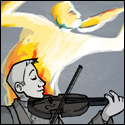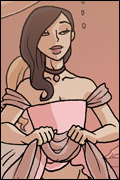|
Cthulhu Dreams posted:We talking the big climatic fight? Yeah, I think an epic party could chew through him. But then again, maybe that's okay? But yeah it's like a crazy neat hexcrawl. I can't wait for my players to remake the world
|
|
|
|

|
| # ? May 15, 2024 06:06 |
|
Oh dear. So I've only ever run some free form one shot sessions for 4e, and my physical materials are MM3, PHB1 &3, DMG1, and Adventurers Vault 2. What should I look into next and how much errata do I need to sift through for full on campaign running?
|
|
|
|
You should look into getting the PHB 2, because the armors introduced there are essential to make sure defenses scale up properly for long-term play. I wrote a post on the rest of the errata you need to keep in mind to keep things running smoothly.
|
|
|
|
Well I guess the worst of it will be reading some new material and restatting some of the relevant old monsters. Thanks!
|
|
|
|
Nomadic Scholar posted:Well I guess the worst of it will be reading some new material and restatting some of the relevant old monsters. Thanks! If you want, you can get the Monster Vault, which has most (if not all) of the MM1 / traditional D&D monsters, but with MM3-compliant stats.
|
|
|
|
Well, that will save on shelf space and reading time. Sweet.
|
|
|
|
Also the Rules Compendium, which has all the basic rules with the errata already baked in. Specifically the DCs in the DMG are completely out of whack.
|
|
|
|
As a public service announcement, I would like everyone to stop using skill challenges in 4E, at least in any way close to how modules have used them. The system is generally "Find big number on your skill list, roll that, done. Guy next to you does same until you have X successes." Failure basically means nothing in most cases, too. It is so dull and pointless that it's almost unbelievable.
|
|
|
|
hm would a better idea for skill challenges be something like: Roll your skills as necessary for a set amount of times. and like a success is a +1 and a failure is -1 and at the end you add up all the successes and failures and you get a trinary failure, success with a complication, success (maybe break it down into 4 or 5 categories) you're still rolling your big numbers but maybe in some challenges some skills could give an extra +1 success?
|
|
|
|
OneThousandMonkeys posted:As a public service announcement, I would like everyone to stop using skill challenges in 4E, at least in any way close to how modules have used them. The system is generally "Find big number on your skill list, roll that, done. Guy next to you does same until you have X successes." Failure basically means nothing in most cases, too. It is so dull and pointless that it's almost unbelievable. Yeah, it was a laudable goal to try and make out-of-combat skills as worthwhile as combat stats, but it did just turn into a dice-rolling fest with no real choices. I'd love to see a system where skill use scenes (picking locks, disarming traps, negotiations etc) had the same kind of in-depth, interesting treatment that combat does, but skill challenges aren't it.
|
|
|
|
Gort posted:I'd love to see a system where skill use scenes (picking locks, disarming traps, negotiations etc) had the same kind of in-depth, interesting treatment that combat does, but skill challenges aren't it.
|
|
|
|
Poison Mushroom posted:We have those, and they're called puzzle games. Yeah, let's put those in D&D. I saw a fun system for doing so in the boardgame Mansions of Madness where you did tile-sliding puzzles to unlock doors and fix broken things, and your intelligence modifier gave you extra tile slides per turn. That'd be pretty cool to integrate into D&D. Charisma-based stuff is tougher, though, and might be better-off roleplayed through. I'm always of two minds whether charisma should even be a stat in D&D given that generally the goal is to have someone act out what they say to NPCs instead of saying, "I roll bluff, 17, does he give me the thing?" Gort fucked around with this message at 12:39 on Feb 25, 2016 |
|
|
|
For me, it largely comes down to a bigger question of "what's the goal?" If the goal is to convince a guard to let you pass by the gate, just do a single roll, whatever, who give a poo poo. If instead you're trying to impress a king or whoever to give you a weighty boon, don't put all the focus in the final conversation. Set up some requirements, and a few bonus objectives or things to clear out. Like, sure, ye olde warlord goes to convince the king to help you out, but the fighter meanwhile gets in good with the captain of the guard after some sparring and helping him train to spread the party's good name, the rogue does his footwork in advance to find out what sorta things the king is into (and what he hates so you know what to avoid), the ranger "coincidentally" runs into the king while he's out falconing and connects with him through the sport, etc, etc. The point is, "convince the king to aid you" doesn't have to be a single scene. This isn't even touching adding more detail and drama to it - maybe some nobles very much want you to fail, so now the rogue has to get some blackmail on them to keep them off your goddamn back, and the ranger has to play overwatch on the party and watch their trail to make sure nobody's coming at you from the back. If it's not important, make it one roll in one scene. If it IS important, don't be afraid to expand it beyond that.
|
|
|
|
Perhaps the flaw was that Skill Challenges were never really explained all that well, because in most every anecdote I've ever encountered with regards to bad skill challenges, the problem is that the DM presents a single obstacle, then asks the group to come up with an appropriate skill to get past it. If there are ghosts guarding a hallway and the Cleric uses a successful Religion check to commune with the ghosts to let them pass, that's it - the whole party gets to pass and the DM shouldn't have the Fighter come up with a skill check to get past the ghosts, or for the Rogue to come up with a skill check to get past the ghosts. Rather, the entire passage through the temple should be a skill challenge. You come to a hallway filled by ghosts - the Cleric Religion's you past it. You come to a tunnel blocked by rubble - the Fighter Athletic's the rocks out of the way. You come to a locked door - the Rogue Thievery's the keys out of the nearby guard. You end up at the evil, desecrated altar - the Wizard Arcana's the ritual to summon the unholy presence corrupting the temple ... and you all roll for initiative. I mean, let's look at the example presented in 4e's DMG 1: quote:The PCs seek a temple in dense jungle. Achieving six successes means they find their way. Accruing three failures before achieving the successes, however, indicates that they get themselves hopelessly lost in the wilderness. Or the one presented in DMG2: quote:A demonic creature called forth by a mysterious ritual has attacked the characters, and now they need to find out where it came from. In this skill challenge, the characters make use of their deductive powers (Perception and Insight), their ability to navigate the streets and denizens of the city (Streetwise, Diplomacy, and Intimidate), and their knowledge of or research about the demon itself (Arcana). The characters must assemble what clues they have into a coherent picture of the threat that faces them as they make their way down to the lowest levels of the city to find the source of that threat. In both cases, the things to apply your skills against are never the same things over and over. The DM puts up a barrier, and asks someone in the group to try and get past it. Then he puts up another, different barrier, and asks someone in the group to try and get past it. And so on and so forth. Putting up a single barrier then asking everyone to narratively twist their skills to all roll against that one obstacle feels bad and disjointed, but that was never how Skill Challenges were meant to be used. Gort posted:Charisma-based stuff is tougher, though, and might be better-off roleplayed through. I'm always of two minds whether charisma should even be a stat in D&D given that generally the goal is to have someone act out what they say to NPCs instead of saying, "I roll bluff, 17, does he give me the thing?" It's important to remember that it's always within our power as the GM to say "yes, it succeeds, no need to roll". It was a bit of an eye-opener to have recently read a game where the skill resolution mechanic was "we have a rudimentary roll vs target number system written up, but we really want to promote the aesthetic that character action trumps random rolls. If the player has a plan to deal with a problem, let them have the success", which I think jives well with preventing these situations where you can roleplay a big speech to the King, but then the GM asks for a Diplomacy check, the player ends up with a 1, and then the whole thing feels disconnected. To connect this to Cirno's post, the skill challenge could be getting into the King's good graces enough to have that audience in the first place, whether by ingratiating yourselves into the Court by various means, or even by sneaking into the Court (analyzing when the King will be alone, scooting past patrols, etc.).
|
|
|
|
Gort posted:I'm always of two minds whether charisma should even be a stat in D&D given that generally the goal is to have someone act out what they say to NPCs instead of saying, "I roll bluff, 17, does he give me the thing?" Of course it should be a loving stat, because the shy person who doesn't talk much or the person who is bad at coming up with speeches or lies or being scary off the top of their heads has just as much of a right to be able to play and pretend to be someone who is charismatic as the most out-of-shape nerd has to play a fighter or the most clumsy motherfucker has to play a rogue. There is literally no difference between someone saying "I'm going to roll thievery to pick the lock" and "I'm gonna roll bluff to lie to this guard about why I'm here." They both exist for the same reason, to be a simple way to have your character perform an action which they are good at, but the player may or may not be. I don't understand how anyone can look at that (getting rid of charisma, having to act out all of your charisma related checks) and not realize that it means that you're saying "no one is allowed to play a character who is more charismatic than themselves" and not see how loving terrible a rule or idea that is. But I still see it all the time, and applied to the other mental stats as well, with DMs pulling gotchas about basic world information on players whose characters would definitely know (or be able to roll to find out) or characters with high wisdom not being able to know when something is a common-sense bad idea because their players don't realize it. That poo poo needs to stop.
|
|
|
|
I just got done talking about how I'd prefer lockpicking to be an involved minigame instead of "I roll lockpicking" so Anyway, there's plenty of poo poo in the game you rely on the player for instead of the character. Nobody ever said, "My character's a tactical genius, GM, please pick the correct actions my character will take in this combat, I'll roll tactics for it". A game is just plain duller if all it is is a series of attack and skill rolls, and GMs and players alike should be encouraged to make the game more than that.
|
|
|
|
gradenko_2000 posted:It's important to remember that it's always within our power as the GM to say "yes, it succeeds, no need to roll". To play off Jolyne Cujoh's point and gradenko's, there's nothing wrong with allowing mechanical aspects to represent a character who is smarter, stronger, faster, more perceptive, or more charismatic than the player. The issue that creates a feeling of disconnect is that binary success/failure where it doesn't seem to matter how good a character actually is at something. It's supremely frustrating for a player to have a character to have the stated quality of being a brilliant planner or a fast-talker and having that narrative repeatedly invalidated and undercut by a bad roll. Ultimately this is an issue with how DM's present success and failure. There's too often a tendency to have failure be a hard stop, and to describe all failures as complete embarrassments or negations of ability. There are a couple easy ways to get around this, even in a system like D&D. One is purely descriptive. In gradenko's example, a failed speech by a charismatic speaker shouldn't be described as a stammering disaster. Instead, it should be more like... quote:As your voice fills the king's hall, the courtiers and counselors listen in rapt attention, hanging on every word. Occasionally one or another nods at a salient point, while your stanchest opponents frown in concentration, trying to find holes in your argument. The king himself rubs his chin in thought. It's still a failure, but it doesn't put lie to the idea that the character has the quality of being charismatic, or their plan being well reasoned. Charisma and logic don't always win out. Acknowledging what a character is supposed to be while respecting the results of the check requires a little more work on the DM's part, but it helps a lot. To build on the above example, failing to convince the king shouldn't be a hard stop to the adventure. A charismatic character might not have succeeded at their goal, but maybe their qualities give them a new opening. quote:As the meeting breaks up, you try and fail to think of another argument or flourish that might have changed the outcome. As you stand there, you suddenly spot the Duchess approaching. "The king may not have heard you, but some here were listening. If you'd like, I can arrange a meeting later this evening..." Maybe the party is about to get sucked into a plot with revolutionaries. Maybe it's just chance to build a coalition to eventually change the king's opinion, but more slowly and with greater effort than the party had hoped for. But it's a way forward opened by the qualities of the character that doesn't invalidate the failure.
|
|
|
|
Gort posted:I just got done talking about how I'd prefer lockpicking to be an involved minigame instead of "I roll lockpicking" so Fair enough on the first point, I should have stuck with my original example of "I roll athletics to bash the door down" instead of rewriting it to call back to the thing that remembered being discussed in the couple of posts before mine. But still, I disagree about making lockpicking an involved minigame, because it has the same problem of disallowing someone who is bad at that minigame or who doesn't feel up to doing that minigame over and over from being able to play as someone who is good at picking locks. I also super disagree that no one has ever said "Hey, pick my character's actions for me," because they do, all the time. Every time someone asks "Hey should I use [encounter/daily power], does this fit with the rest of y'all's plans for the next round, or do you think we need it or whatever" or "hey, my original plan is hosed now, what should I do?" to the table, they're doing exactly that. They're gathering the information that their character should just be able to know so that they can use that information and make decisions about it, or they're calling to the rest of the group (which includes the GM) to help them make the decision that their character would make. And even if they don't do that stuff ,if someone is playing a character that is supposed to be a tactical genius and makes a huge tactical fuckup, the GM should say "Hey, are you sure you want to do that? It's a bad idea because of x," because the player wants to play a character who won't make a huge fuckup like that without good reason. And hell, I agree that having the game be more involved than "roll dice to overcome obstacles" is fun and should be encouraged, but what you're suggesting isn't encouraging involvement, it's requiring it, which doesn't jive with "Fantasy Wish Fulfillment Simulator 4th (actually like 6th) Edition" where you're supposed to be whatever sort of character you want to be and be able to escape your shortcomings for a while. I love giving stupid speeches and being involved with roleplay and speaking in character for long stretches of time, but even then I sometimes have to say "gently caress, I really can't think of anything but George would be able to. Can I just roll Diplomacy?" and that's a good thing, and what the skill system was designed to handle. If your group is cool with being required to do speeches and minigames for their skills then, fine, whatever, but they shouldn't be a required part of a system which has the core attraction of "be someone you are not" where the primary function is escapism.
|
|
|
|
It's also important to note RE: Skill Challenges that they most likely were completely untested and written on the cuff at the last minute. Remember, the entirety of 4e was pushed out somewhat early because they had a previous engine (codenamed "Orcus") that they ended up having to scrap in it's entirety.
|
|
|
|
This is from D&D 4e Rules Compendium, so the last revision of the rules:D&D Rules Compendium 4e posted:SKILL CHALLENGES fairly involved, but quite well explained I think. And it's more than just "everyone roll their best skill and wrap it up in three minutes". I think the biggest problem with skill challenges is just a failure of getting the concept across adequately initially. starkebn fucked around with this message at 23:12 on Feb 25, 2016 |
|
|
|
Well, the "best skill" thing is just the usual player approach to being asked to roll a skill, i.e. "hey we need to make an Arcana check, who's got the highest mod?" It's funny how often it works out that when the fighter handles something that turns out to be magic, the wizard will have stood right next to him watching closely all along 
|
|
|
|
My Lovely Horse posted:Well, the "best skill" thing is just the usual player approach to being asked to roll a skill, i.e. "hey we need to make an Arcana check, who's got the highest mod?" I spent a lot of time when playing or running D&D seriously considering just making skills a group thing full stop. All skills are rolled with the highest mod the group possesses, and the group decides which characters do what and how in-world.
|
|
|
|
Gort posted:I just got done talking about how I'd prefer lockpicking to be an involved minigame instead of "I roll lockpicking" so This is awful because it restricts the "good at lockpicking" characters to those who are played by the people who are good at the minigame. This is also bad, because it means that anybody who is good at the minigame is also good at lockpicking regardless of skill investment.
|
|
|
|
ProfessorCirno posted:It's also important to note RE: Skill Challenges that they most likely were completely untested and written on the cuff at the last minute. Remember, the entirety of 4e was pushed out somewhat early because they had a previous engine (codenamed "Orcus") that they ended up having to scrap in it's entirety. I strongly suspect that Skill Challenges were based off of Complex Skill Checks thespaceinvader posted:I spent a lot of time when playing or running D&D seriously considering just making skills a group thing full stop. All skills are rolled with the highest mod the group possesses, and the group decides which characters do what and how in-world. That's practically what it ends up being anyway, and jives with the GUMSHOE idea of "adjust the number of skill points gained by any individual depending on the size of the party, and then explicitly tell the players that they should spread out their skills so that at least one person has one point in each skill, across the entire party"
|
|
|
|
gradenko_2000 posted:I strongly suspect that Skill Challenges were based off of Complex Skill Checks SW Saga edition's Galaxy of Intrigue book had an entire sideline on skill challenges - whether or not that's pre or post 4e, I'm not entirely sure, but really saga edition is proto-4e in a lot of ways, except for the continued multiclassing obsession.
|
|
|
|
dwarf74 posted:Yeah, I think an epic party could chew through him. But then again, maybe that's okay? You're considerably ahead of me in the AP, so I'd appreciate if you could give us your thoughts on what you'd change/watch out for/cut/adapt in the adventures - my one beef with this AP is that there is a real shortage of that sort of input kicking around.
|
|
|
|
SKILLS: A choice so ENRICHING that you may as well not even pick any or use the system at all.
|
|
|
|
Cthulhu Dreams posted:You're considerably ahead of me in the AP, so I'd appreciate if you could give us your thoughts on what you'd change/watch out for/cut/adapt in the adventures - my one beef with this AP is that there is a real shortage of that sort of input kicking around. Well, we are into #8. My biggest advice is to read ahead a few adventures. Start positioning stuff like the Fey Titans and whatnot before they become imminent. Oh, and naval combat is funky and rather weird/incongruous/broken. If your players are into it, good. Otherwise... Well... Apart from some enemy stat tweaks here and there, I'm running by the book.
|
|
|
|
And then there are folks like my one player who pumps one skill sky-high, as much as 4E allows, and then tries to find ways to use that skill for absolutely everything; and who makes that skill Endurance of all things.
|
|
|
|
Bluff for my money is the funniest skill, because they took a look at the 3E diplomancer and decided, "You know what, by epic, you should be able to do that with the right class and powers." So you can bluff people's memories away, use bluff for every social test, use bluff as your initiative, and probably more crap I'm not even thinking of at the moment.
|
|
|
|
The best skill challenges I've seen so far have always been along the lines of "Something is going down soon, you have enough time to do X number of things. You get a unique bonus for every thing you succeed in doing." Depending on what the bonuses are, you start having characters roll off-skills because the bonus is more interesting. The bad skill challenges were always really rudimentary stuff along the lines of "So your party is traveling through the mountains and it's really loving cold, what do you do?" and the players just go whatever, roll Endurance or mark off a healing surge.My Lovely Horse posted:And then there are folks like my one player who pumps one skill sky-high, as much as 4E allows, and then tries to find ways to use that skill for absolutely everything; and who makes that skill Endurance of all things. I'm surprised they aren't trying to min-max Streetwise. Endurance is at least plausibly useful most of the time it seems.
|
|
|
|
isndl posted:I'm surprised they aren't trying to min-max Streetwise. Endurance is at least plausibly useful most of the time it seems. Really? Endurance is by far the least-used 4E skill in my experience simply because most things treat it as simply a "defense" of sorts, it's the least proactive skill on the list. It's equally redundant because, y'know, everyone's Fortitude is right there.
|
|
|
|
I've had her try and win a debate by simply arguing on and on until the other guy lost his nerve. Actually not unlike her playstyle. In retrospect that's a lot funnier than it seemed at the time. Or another thing that I thought was a legitimately original idea: lose a guy that was tailing her by picking a route through the city that took her up and down as many stairs as possible.
|
|
|
|
Endurance is either a really useful skill or totally useless, since it's basically impossible to use it in an active attempt to do something. Streetwise is "Why aren't we rolling Diplomacy, again?"
|
|
|
|
ProfessorCirno posted:It's also important to note RE: Skill Challenges that they most likely were completely untested and written on the cuff at the last minute. Remember, the entirety of 4e was pushed out somewhat early because they had a previous engine (codenamed "Orcus") that they ended up having to scrap in it's entirety. I've never heard of this, what was the gist of what "Orcus" was?
|
|
|
|
WilliamAnderson posted:I've never heard of this, what was the gist of what "Orcus" was? There's a timeline in Wizards Presents: Races and Classes that gives us a brief glimpse of what it was: 1. Pre-design for 4th Edition begins in early 2005, with Rob Heinsoo, Andy Collins and James Wyatt as the three key people 2. A design workshop is conducted in May 2005, and that's where the main designers agree on: explicitly defined party roles three tiers of play of ten levels each "a system that provided powers for all classes" 3. From Jun to Sep 2005, the designers work on the broad design of what called "Orcus I". The output of this was a document that included eight classes, powers for all of them, monsters and rules 4. This next part is important, so I'll just lift an excerpt straight from the book: quote:First Development Team: October 2005 through February 2006 Now, we know that Tome of Battle was officially released in Aug 2006, so the timeline fits. 5. From Feb to Mar 2006, they work on Orcus Phase 2, but the most we get out of Heinsoo here is that after a bunch of playtesting, they thought that Orcus wasn't going in the direction that they wanted. 6. Another important development, and another excerpt: quote:One Development Week: Mid-April 2006 What this sequence of events tells us is that Tome of Battle wasn't quite a testbed for ideas that would immediately make their way to 4e, but rather an entirely different approach to powers that 4e at some point deliberately diverged from. The next notch on the timeline is May 2006 to Sep 2006, when Rob Heinsoo, Andy Collins, Mike Mearls, David Noonan and Jesse Decker work on something they called Flywheel, which "move[s] closer to 3.5 by dealing properly with powers and resources that could be used at-will, once per encounter, or once per day". After that, the "Scramjet" team is formed to do the 4e D&D lore rework, and then focused design on the PHB 1 begins in Oct 2006, and it's an almost straight line to the 4e release from there on out. So Orcus was this abandoned design, a sort of "what could have been" for 4e that we saw a bit of in Tome of Battle, but upon reflection is actually quite different from 4e because if you really try to compare the ability refresh mechanics, the Crusader/Swordsage/Warblade don't have anything like the AEDU model. It's not per-encounter and nothing's on a daily refresh either. On a somewhat unrelated note, there's also this other small passage: quote:Mike [Mearls] was fresh from adapting Orcus II ideas for Tome of Battle: The Book of Nine Swords. He contributed many innovative class concepts and designs during this stage. Mike probably shook things up the most when he designed a few classes that will be appearing in the 4th Edition Player’s Handbook II. I looked at Mike’s designs of the barbarian and the druid and thought, “Oh, geez, this is the cool we need to be getting from all our classes.” If you think about how the 4e Barbarian's different Rage powers are actually adaptations of the "Stance" system from Tome of Battle? That's probably because Mearls worked on Tome of Battle, but not on the 4e PHB 1, but then did work on 4e PHB 2 and adapted Tome of Battles stances for that later book. It also jives with Mearls taking over for Essentials and then having the Fighter subclasses (Slayer, Knight) and the Hunter subclass leverage Stances heavily. The designs were his baby, and he keeps leaning on them the same way he leaned on the Reserve Points mechanic for Iron Heroes and then brought it into D&D 5th Edition.
|
|
|
|
Khizan posted:This is awful because it restricts the "good at lockpicking" characters to those who are played by the people who are good at the minigame. This is also bad, because it means that anybody who is good at the minigame is also good at lockpicking regardless of skill investment. Counterpoint: The combat system, which is an involved minigame. And yet we don't hear people calling for the combat system to be boiled down to a single dice roll because they "aren't good at the combat minigame".
|
|
|
|
Gort posted:Counterpoint: The combat system, which is an involved minigame. We... kind of do have that as an option, though. Simple classes with basically one verb, "I attack" or "I Twin Strike" or whatever, for players who really aren't into the complicated combat minigame so much. I wouldn't ever play one of those builds but I'm glad they exist. EDIT and I think they should exist for more archetypes than the martial striker, obviously, that's a dumb restriction
|
|
|
|
Gort posted:Counterpoint: The combat system, which is an involved minigame. because 1.) combat is the game and 2.) it involves everyone not just one dude trying to lockpick and being told to sit in the corner and play with a puzzle for 5 minutes while everyone else waits for them. skills as minigame disengages the player from the rest of the game
|
|
|
|

|
| # ? May 15, 2024 06:06 |
|
Elfgames posted:because 1.) combat is the game and 2.) it involves everyone not just one dude trying to lockpick and being told to sit in the corner and play with a puzzle for 5 minutes while everyone else waits for them. skills as minigame disengages the player from the rest of the game Is "there's a door, it's locked, roll until you unlock it, no penalty for failing" actually a scenario anyone puts in their game, though? The minigame idea would be far better used in a combat scenario - the rogue is picking the lock, the fighter is keeping the kuo-toa at bay, and the wizard is trying to counterspell the magic trap filling the room with water. Each one is playing a minigame (rogue is playing the lockpicking minigame, fighter is playing the combat minigame, wizard is playing the magic puzzle minigame and they're all minigames of the same depth and interest) and they're all contributing to the scenario equally in different ways. In the current system, only the fighter in that scenario actually has any interesting choices to make - he gets to choose what powers to use, where to stand to get flanking/terrain bonuses, what items to use, the whole combat minigame - whereas the rogue and wizard are reduced to "roll thievery/arcana a few times and maybe use a skill utility power if you happened to take one". I think the game would be more interesting as a whole if more parts of it had the same level of detail that combat does. I don't think that goal is unreasonable - it's what they were trying to move towards with skill challenges in the first place.
|
|
|































